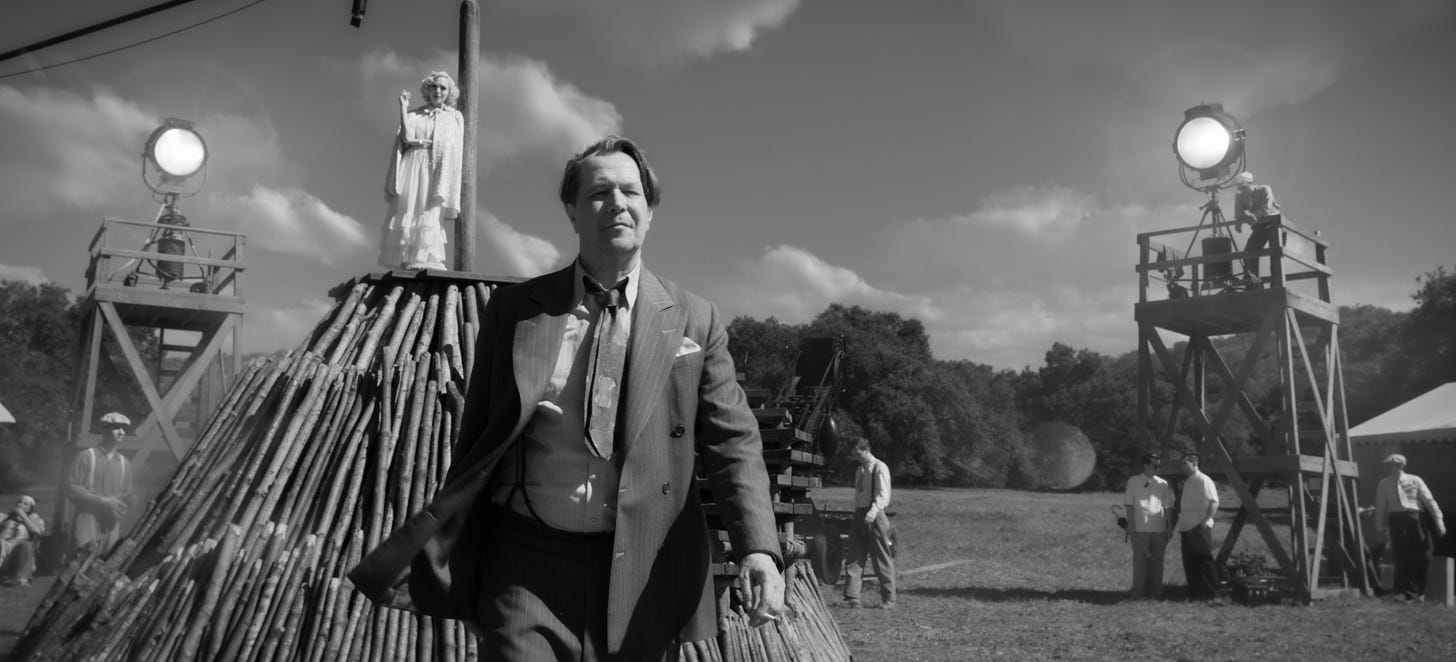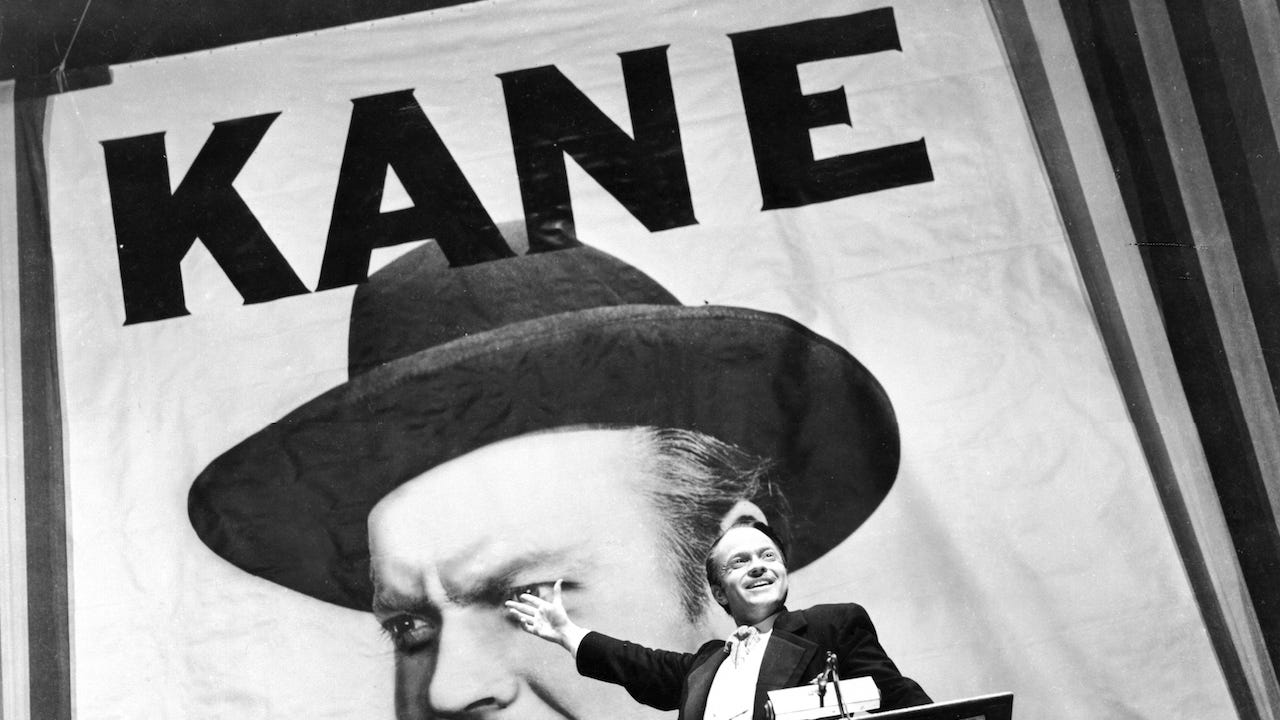Movie Theaters Were Fun While They Lasted
Plus: 'Mank' reviewed, 'Kane' assigned, and a happy hour tip!
There were ominous rumbles on Twitter yesterday around noon. A few members of Film Twitter had obviously been given an embargoed press release, one that would change the game, alter the world of filmmaking as we know it, reset the entire cinematic universe. The guessing game began on Slack and Gchat: What was headed to streamers? Was Disney pulling the trigger on Black Widow? Did Netflix buy No Time to Die? Heck, did Netflix just buy all of MGM?
How naïve we were. How small we were thinking.
With Warner Bros. announcing that its entire slate is going to debut in theaters and on HBO Max simultaneously next year—from big releases like The Matrix 4 and Dune to more intimate fare like the Sopranos prequel The Many Saints of Newark and awards bait like Judas and the Black Messiah—the game has changed in a fundamental way. Warner Bros. and HBO’s parent company, AT&T, is looking to shake things up and make HBO Max a must-own in every home, the place to go if you’re looking for a deep library, great new releases, and family-friendly fare to distract the kids while they’re stuck at home for the sixteenth month in a row.
Given that it’ll take most of next year for the coronavirus vaccine to a.) roll out and b.) be adopted by a sufficient number of people to work as a protective measure, WB was stuck in a tough spot. They could either roll the dice on potentially lackluster box-office revenue or they could try to shore up their streaming service, which, despite being great, has had a hard time getting a foothold given the fact that you couldn’t get it on Amazon devices (now fixed) or Roku devices (solution still pending).
They went for door number two.
As is my wont, I’m more concerned about what this means for the state of theaters than anything else. Sure, TVs are better than ever, but still: I need that theatrical experience in my life, man. And I know I’m not alone. This is obviously a devastating blow for theaters, doubly so if the Mouse House decides to follow suit in an effort to attract people to Disney+ or if Comcast decides to divert Universal’s offerings to VOD. You could very easily see a domino effect where 2021’s theatrical calendar gets wiped out just as 2020’s calendar was wiped out—or reduced to an afterthought, as customers stay at home and stream rather than heading out to the theater.
If WB is the only studio to go this route, however, theater owners will be faced with a pretty stark choice. They could accept the smashing of this window as a one-time, temporary thing, comfortable in the knowledge that theatrical revenue is fundamentally irreplaceable by VOD, and try to wring a better share of the box office gross out of WB. Instead of the average 53 percent of box office returns, maybe they could get 60 or 70 percent. A bigger piece of a much, much smaller pie.
Or they could tell WB to get stuffed. That the studio has altered the bargain too much. That theaters won’t play second fiddle to the streamer and that if they want to forgo theatrical revenue, well, they’re just going to have to forgo all of it, and good and hard.
Warner Bros. has made their choice. I’ll be very curious to see what theaters choose to do in response. And while I’d be a little surprised if they decided to forgo income from films in the Matrix, Godzilla, and Dune franchises, I wouldn’t be shocked.
Review: Mank (Netflix)
Mank is a sly, odd little movie from one of our most interesting directors, David Fincher.
On the surface, Mank is about the making of Citizen Kane. Or, really, the writing of Citizen Kane, the struggle undertaken by Herman Mankiewicz (Gary Oldman) to translate the life of the most important newsman of the early 20th century, William Randolph Hearst (Charles Dance), and his longtime companion Marion Davies (Amanda Seyfried) into a film. It is also about the studio system and the sniveling servility of the so-called moguls; bold-faced names like Louis B. Mayer (Arliss Howard) and Irving Thalberg (Ferdinand Kingsley) come in for a drubbing, both for bending a knee to Hearst and for using the power of the studios to crush the gubernatorial aspirations of Upton Sinclair (Bill Nye—yes, the Science Guy)
And, of course, it’s about the mechanics of making movies, the theme that ties all of these disparate strands together. Mank is a hack’s hack, playing script games in an exec’s office where writers take turns ginning up plot points as they go in front of a bewildered Josef von Sternberg. And the ability to start and stop production on a dime and slide different players into different roles allows Mayer to commission a series of advertisements made with movie magic that drive the final nail into the Sinclair campaign’s coffin.
Fincher’s is a deeply dyspeptic look at moviemaking as a business, but it’s done with enough humor and enough style that it rarely feels ugly or meanspirited. Shot in black and white, and with fabricated “cigarette burns” (the reel-change markers those of us of a certain age will remember being explained for the first time in Fincher’s film Fight Club), Mankis designed to mimic age while being vibrant and modern in both tone and look. In that, it is very much like Citizen Kane, a film whose angles, camera moves, and elliptical structure give it a contemporary sensibility that eludes most other classics of its day.
Oldman is wonderful as always as the titular scribe, his countenance moving from that of a resigned, above-it-all hack to a more righteous defender of his, and others’, rights. And the skewed eye that Oldman-as-Mank turns toward Hollywood’s effort to sway the 1934 gubernatorial race in favor of the Republican candidate and away from the radical Sinclair takes on an extra valence with Oldman in that role.
I’m not terribly interested in litigating whether or not the movie is “too hard” on Orson Welles, who comes across as a petulant showman outsourcing creative labor rather than a true artist here. The companion piece to Mank is Pauline Kael’s Raising Kane, an essay-turned-book designed to defeat the notion of auteurism by suggesting that Welles neither deserves credit on the screenplay for Citizen Kane nor an excess of praise for the story’s visual components, given the work of collaborators like Gregg Toland. Since we can see Welles’s visual flair throughout his work, in films as varied as The Magnificent Ambersons, Touch of Evil, F for Fake, and Chimes at Midnight—or the Netflix-saved The Other Side of the Wind—I’m happy to pass on this line of thinking.
The fight over credit is, honestly, a small (and in the end, uninteresting) part of Mank. More intriguing are the various subtexts Fincher has brought to bear. After all, in a Netflix original production, he’s made a movie about the grotesquerie of cinema as #content, a movie about the fact that suits don’t really care about artistry, they just want something to keep the rubes glued to the screen. (It calls to mind the Coen Brothers’ minor dig at the same phenomenon in Netflix’s The Ballad of Buster Scruggs.)
Fincher has also made a movie about Hollywood using its immense power as a dream factory to sway an election and the system’s ability to ensure that everyone votes the same way—or at least publicly appears to vote the same way—lest they become an outcast, unable to find work. The surface take here, and it might honestly be the correct one, is that the suits are wicked and one way they are wicked is that they are forcing people to back a Republican. (No one’s eviler than Republicans, after all.) The slightly deeper take is that Hollywood’s power can be used for good or evil, and creatives should be careful about how that power is used.
The galaxy brain take is that Hollywood rushing to uniformly back anyone or any party is gross and unseemly, and using the power of the studios/star system to crush those who dissent is profoundly immoral. And the casting of Gary Oldman, notable dissenter from Hollywood’s reigning orthodoxy, in the role of a notable dissenter from Hollywood’s reigning orthodoxy, in a movie released during a year in which dissent from the party line was almost completely invisible during a hard-fought political campaign, is either an amusing coincidence or a bit of a clue.
You can decide for yourself which.
Happy Hour
People seemed to like my election night cocktail guide, so I’m going to start a semi-regular list of cocktail tips in this here newsletter. (For more on this subject, you should subscribe to the Substack of Across the Movie Aisle’s Peter Suderman.)
Here’s my first tip: get properly sized martini glasses!
Altogether too many martini glasses are enormous fishbowls filled to the brim with liquor. This is a less-than-ideal way to drink cocktails because it encourages overconsumption and ensures that what you’re drinking will be warm by the end. Instead you want something in line with the Riedel martini glass in the image above: with a capacity of 4.62 ounces, you’ll never be tempted to overserve and your drink will stay cold throughout its consumption.
(Nota bene: The Riedels are very expensive. This set is much more affordable. But I bought the Riedels because I needed a pair immediately and they were all Spec’s had. Also becaue I’m a fancy lad.)
Anyway, 4.62 ounces is all you need when pouring two ounces of Balcones Baby Blue, one ounce of Antica Formula vermouth, and a couple dashes each of Peychaud’s and Angostura bitters—shaken, not stirred—into a martini glass. There’s even room for a cherry, if you desire it.
Assigned Viewing: Citizen Kane (HBO Max)
Mank is good, but Citizen Kane is great. If you’ve never seen it before, you’re in for a treat. And if you’ve seen it a dozen times, odds are you’ll notice something new this time around. There’s a reason it’s generally considered one of the greatest films ever made.







